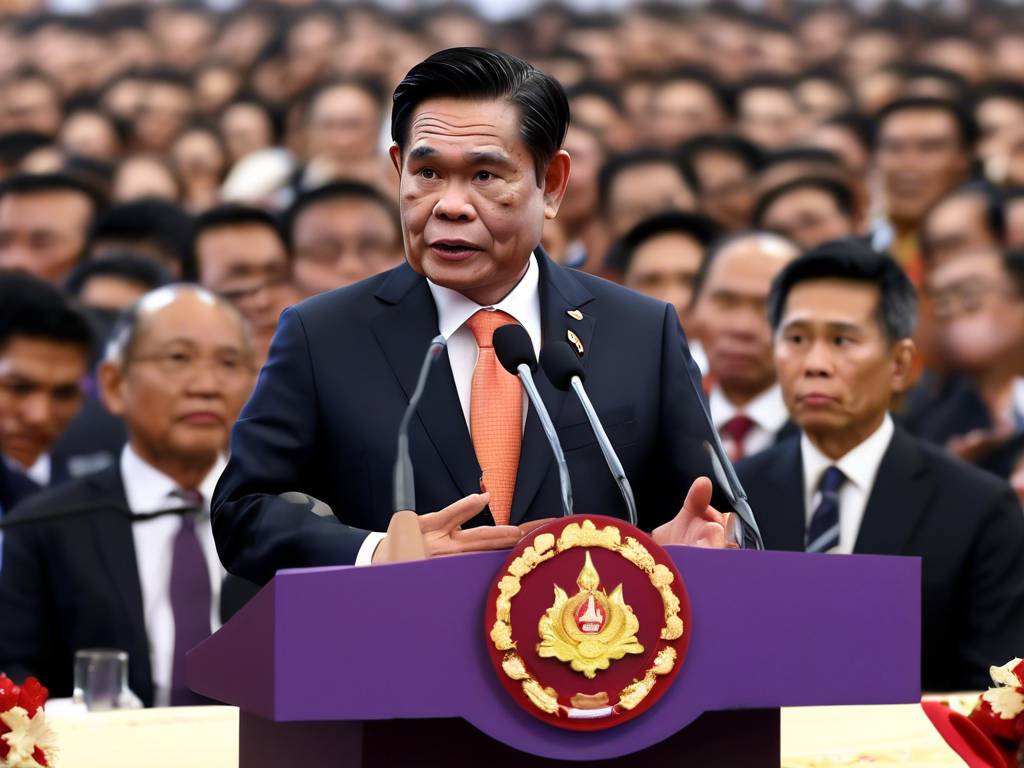Thai PM Encourages Dialogue with Myanmar amid Weakening Regime
Dear Crypto Reader, in a recent interview with Reuters, Thai Prime Minister Srettha Thavisin shared his perspective on the current situation in Myanmar. He highlighted the weakening strength of the military regime and suggested that it might be an opportune moment to initiate dialogues with the Myanmar government.
Overview of Thai PM’s Remarks
During the interview, Prime Minister Thavisin made several important points regarding the Myanmar situation:
– **Timing for Dialogue**: Thavisin believes that the current weakened state of the military regime in Myanmar presents an opportunity for constructive discussions.
– Thavisin stated that engaging in talks with Myanmar at this point could potentially yield positive outcomes.
– **Concern for Stability**: The Thai Prime Minister expressed concerns about the ongoing political instability in Myanmar and its implications for the region.
– Thavisin emphasized the importance of addressing the crisis in Myanmar to maintain regional peace and security.
– **Call for International Support**: Thavisin called on the international community to support efforts to resolve the crisis in Myanmar peacefully.
– The Thai Prime Minister stressed the need for collaborative actions to address the challenges faced by Myanmar.
Analysis of the Thai PM’s Statements
Prime Minister Thavisin’s remarks reflect a nuanced understanding of the situation in Myanmar and a proactive approach to seeking solutions. Here are some key insights from his statements:
– **Strategic Thinking**: Thavisin’s assessment of the timing for dialogue demonstrates a strategic mindset.
– By recognizing the weakening of the military regime, he is taking a pragmatic approach to potential negotiations.
– **Regional Leadership**: Thavisin’s call for international support underscores Thailand’s role as a regional leader in addressing regional challenges.
– His proactive stance on the Myanmar issue reflects a commitment to promoting peace and stability in Southeast Asia.
– **Diplomatic Engagement**: Thavisin’s emphasis on peaceful dialogue highlights the importance of diplomacy in resolving conflicts.
– By advocating for talks with Myanmar, he is promoting a diplomatic solution to the crisis.
Implications for Crypto Investors
As a crypto investor, you may wonder about the relevance of the Thai Prime Minister’s comments on the Myanmar situation. Here are some implications to consider:
– **Regional Stability**: Political instability in Myanmar could impact the overall stability of Southeast Asia.
– Any escalation of the crisis could have ripple effects on the regional economy, including the crypto market.
– **Investment Climate**: Uncertainty in the region may affect investor confidence and risk appetite.
– Crypto investors should monitor the situation in Myanmar and its potential implications for their investment portfolios.
– **Opportunities for Engagement**: The evolving situation in Myanmar may create opportunities for constructive engagement.
– Crypto investors looking to support peace-building efforts in the region could explore ways to contribute positively.
Hot Take: Seizing Opportunities for Dialogue
Dear Crypto Reader, the Thai Prime Minister’s call for dialogue with Myanmar reflects a strategic approach to addressing regional challenges. As you navigate the ever-changing landscape of the crypto market, consider the following:
– **Opportune Moment**: The current situation in Myanmar presents a unique opportunity for constructive engagement.
– Stay informed about developments in the region and assess how they may impact your investment decisions.
– **Diplomatic Solutions**: Diplomacy and dialogue are essential tools in resolving conflicts and promoting stability.
– Support efforts that contribute to peaceful resolutions in areas of political unrest.
– **Regional Impact**: Political developments in neighboring countries can have spill-over effects on the crypto market.
– Consider the broader implications of regional instability on your investment strategy and risk management approach.





 By
By
 By
By

 By
By
 By
By